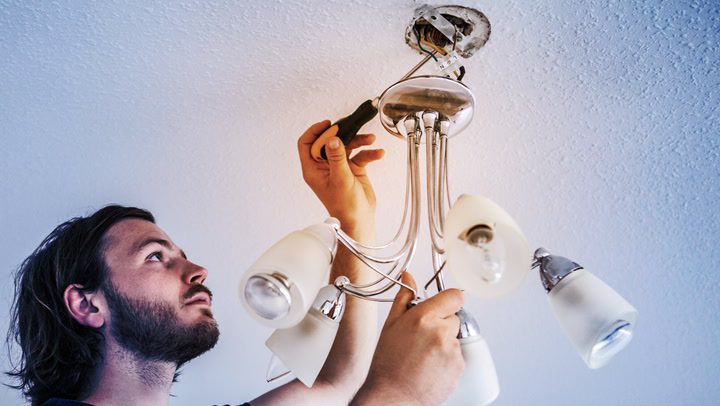What Stays With a House When You Sell It. Massachusetts HomeOwnership MABA
When standup comedian Nathan Brannon moved into his newly purchased home in rural Washington state, it seemed the joke was on him: The previous owner had left the pegboard on the garage wall, but had taken all the pegs. “When I first saw the pegs were missing, I was super confused; I mean, what are you going to do with just pegs?” Brannon recalls. “Now I have a pile of yard tools on the floor in front of the pegboard.”
“What do I have to leave when I sell my house?”
Brannon isn’t the only home buyer to discover that sellers sometimes take the strangest things with them when they vacate a property. We’ve seen home buyers ranting on social media about missing doorknobs, toilet paper holders, and even trees from the front yard.
But it can be far beyond merely annoying for the buyer. If you take something you haven’t negotiated to keep, you could tank the sale or even face a lawsuit. Not sure what you’re allowed to take with you when you move? Here are some rules to keep in mind before and after closing the deal.
1. If it’s nailed down, bolted, or mounted, it probably stays behind
When Laurel-Ann Dooley walked through a vacation property she was purchasing, there was a glaring hole where a storage shed had recently stood. “The previous owner had sold it, even though it was supposed to stay,” recalls Dooley, who’s an attorney and Realtor® at PalmerHouse Properties in Atlanta. While most buyers and sellers probably know that “fixtures” immovable elements of a home such as built-in furniture, fences, or, yes, a storage shed must stay behind, there can still be some confusion, says Bill Gassett, a Realtor® with Re/Max Executive Realty in Hopkinton, MA. (Here’s how to find a real estate agent in your area.)
“Probably the number one gray area that I’ve found is the mounting mechanism for big-screen TVs,” Gassett shares. “Obviously, it’s attached, so it’s supposed to stay with the house. But commonsense says, ‘Well, if somebody has a three thousand dollar TV hanging on the wall, unless they’re including [the TV] with the house, [the mounting mechanism] doesn’t stay.’” “It becomes a real battling point with buyers and sellers if it’s not specifically referenced,” he adds.
Generally, Dooley says, if a house has been modified for an item, it’s probably a fixture. “If an air-conditioning unit is placed in a window, it’s arguably personal property and the buyer can take it with them,” she says. “But if a hole has been cut in the wall to accommodate the unit, then it’s most likely a fixture.” With that said, you want to avoid “arguably”, “probably”, or “most likely” when it comes to selling your home, Dooley cautions. Be specific and firm.
“If you want it, say so upfront,” Dooley advises.
2. Leave Mother Nature alone
Unless the property listing specifically mentions that you intend to take the prized rose patch your Aunt Zelda gave you, sellers cannot remove any landscaping, Gassett says. “I’ve had sellers with specific requests to take certain things that might have been a special gift,” Gassett says. “Otherwise, you can’t just dig up a plant and take it with you; it’s part of the property.”
3. Hands off anything anchored in the ground
Other backyard items are also potential sources of misunderstanding between buyers and sellers. “Technically, if a basketball hoop is cemented into the ground, then it’s considered to go with the house. Freestanding ones sitting on the lawn, however, would be something buyers could take with them,” he says. Ditto for swing sets: If it’s anchored in the ground, it stays.
4. Let go of your lighting fixtures
Even if you’re attached to your show-stopping dining room chandelier, don’t pack it up and leave electrical wires hanging when you leave. And if you’re thinking about swapping out that chandelier right before closing and hoping the buyer won’t notice? Forget about it, Gassett says. “When you buy a property, you’re buying what you saw the day you saw the property and wrote the offer on the house, so for sellers to change something out after that date is illegal,” Gassett warns. Yes illegal.
You can declare your intention to remove it, Dooley says, but be aware that excluded items often become sticking points between buyers and sellers. “Instead, take that chandelier out before you list your house, and put something else there,” she suggests.
5. Do you leave curtains when you move? Yep, window treatments stay, too
You may have spent a fortune on those custom blinds in your living room, but technically, you’re supposed to leave ‘em hanging, Gassett says. “Curtains are always considered personal property, because they just slide off,” he says. “Rods and blinds, on the other hand, are considered part of the house because they’re affixed and attached.”
Mirrors are another murky area, he adds, but pretty easy to figure out: If they’re hung like paintings on a wall, they’re personal property. Bolted to the studs? They’re fixtures.
Don’t be petty—or you might tank the sale
Often, the littlest things cause the most heated debates, or even the derailment of the sale itself. Sometimes, as in Brannon’s case of the missing pegs, sellers remove things from the house that aren’t worth chasing after, but are incredibly annoying nonetheless, Gassett says. For instance, he recalls a seller who took the control box for an underground dog fence.
“In real estate deals, some people take it out on the buyer by nickel and diming on stuff,” he says. “Especially if they don’t feel the sale has gone exactly the way they wanted it to, or they have resentment towards the buyer.” Dooley heard of a seller who removed all the lightbulbs in the house before moving. “With the amount of money you’re talking about on the sale of a home, I can’t imagine attaching sentimental value to your sixty watt lightbulbs,” she says. “It’s kind of silly.”
The post Hands Off: What Stays With a House When You Sell It? appeared first on Real Estate News & Insights | realtor.com®.

FIRST TIME HOMEBUYERS
Who Pays the Home Buyer's Agent?
 Both seller's agent fees and buyer agent's fees are part of a typical real estate transaction and are included in the final negotiated purchase price of the property. There should be no additional fees to the buyer for a buyer's agent above and beyond the negotiated purchase price of a home unless specifically agreed in writing between the buyer and agent before an offer is made.
Both seller's agent fees and buyer agent's fees are part of a typical real estate transaction and are included in the final negotiated purchase price of the property. There should be no additional fees to the buyer for a buyer's agent above and beyond the negotiated purchase price of a home unless specifically agreed in writing between the buyer and agent before an offer is made.
In most cases, the seller's agent pays the buyer's agent for bringing the buyer, negotiating the purchase price and terms, writing a legally correct offer, coordinating inspections, responses, and financing plus handling numerous additional details on the buyer's side of the transaction.
Buyers should avoid contacting seller's agents and sellers directly unless they are comfortable negotiating and representing themselves. That is why it is important for buyers to choose their agents BEFORE they begin looking at homes or as soon as possible if they have begun looking.
Did you know that fewer than one percent of the agents and brokers in Massachusetts have committed to being 100% loyal to their buyers 100% of the time?
To learn more about the pros and cons of various types of buyer agents, or to get a list of experienced local 100% loyal buyer's agents to interview without obligation, click the button below.
Find a Great Buyer Agent!
Article From: "Wendy Helfenbaum" Read full article
Get Started with MABA
For no extra cost, let a MABA buyer agent protect your interests



